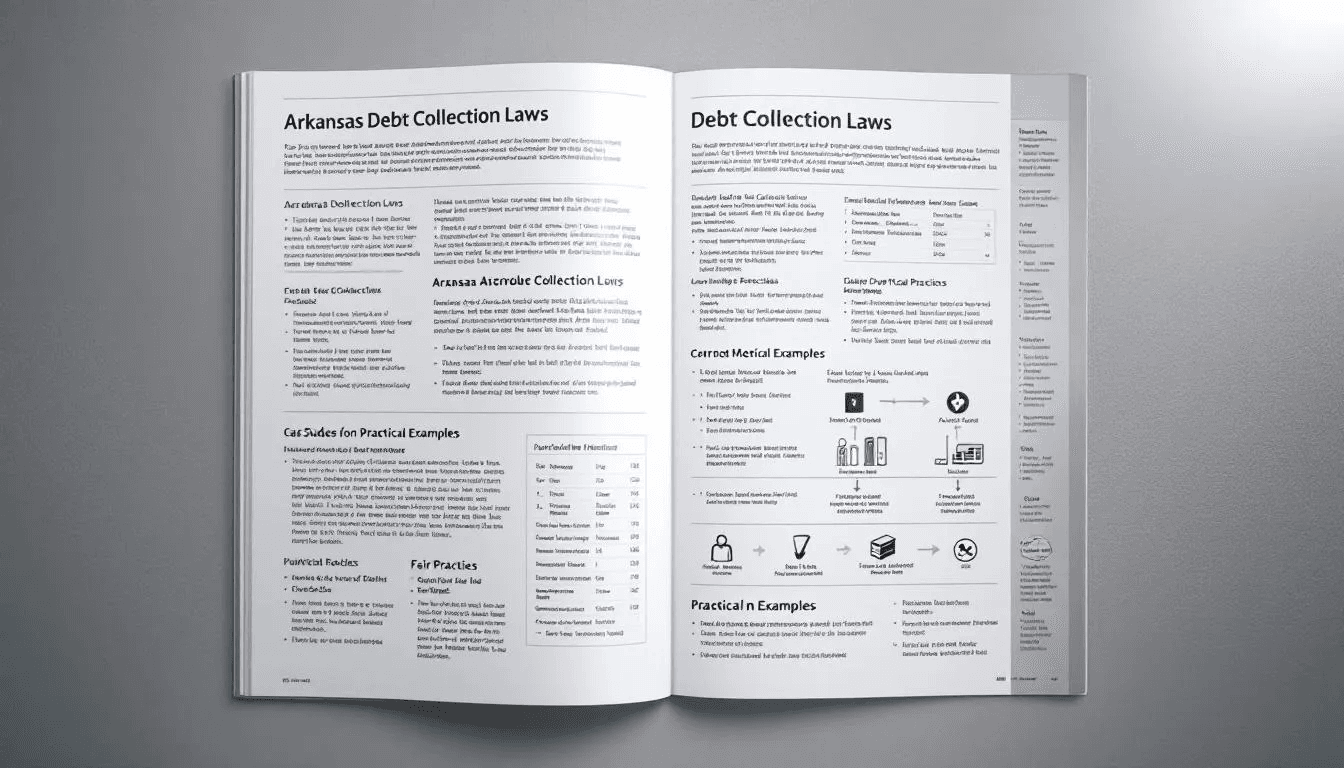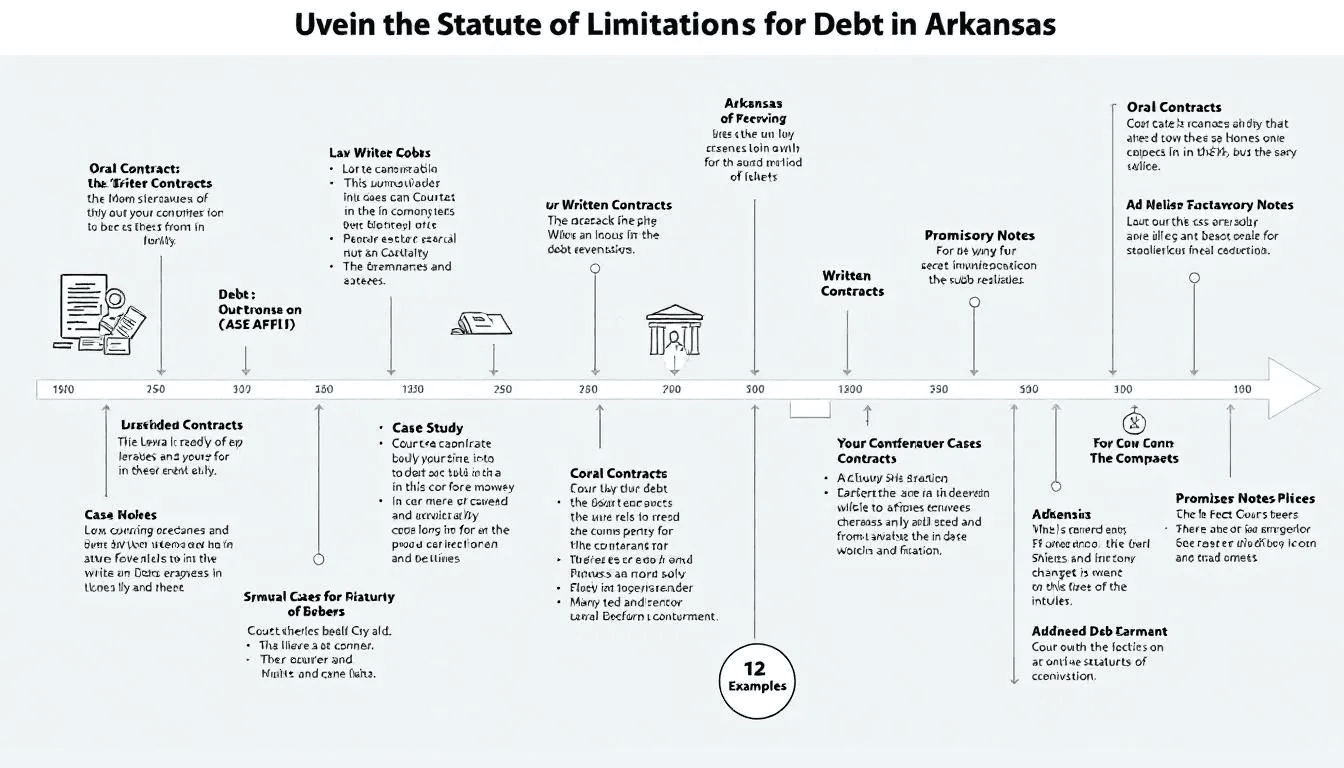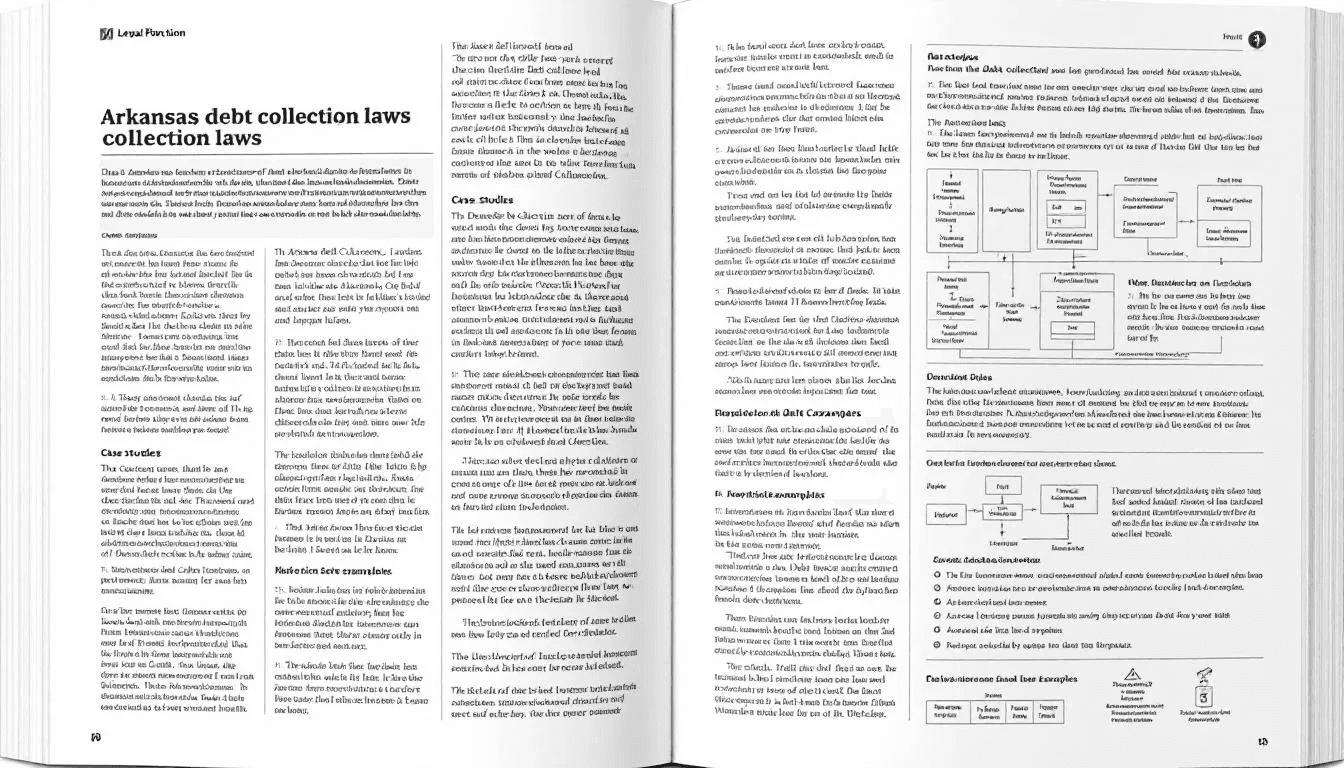Understanding Arkansas debt collection laws is crucial whether you’re a debtor or a creditor. This article will cover the key regulations, including federal and state laws, the statute of limitations, licensing requirements, and your rights as a consumer. Stay informed to protect yourself and ensure compliance.
Key Takeaways
- Debt collection in Arkansas is regulated by both the federal Fair Debt Collection Practices Act (FDCPA) and the state-specific Arkansas Deceptive Trade Practices Act, ensuring consumer protection and fair practices.
- The statute of limitations for debt collection in Arkansas ranges from three to five years, after which debts become time-barred, emphasizing the need for timely action by both creditors and debtors.
- Collection agencies in Arkansas must be licensed and comply with strict regulations regarding consumer treatment, including transparent communication and accurate debt representation, to protect consumer rights.
Understanding Federal and State Debt Collection Laws


Debt collection in the United States is primarily governed by the Fair Debt Collection Practices Act (FDCPA), a federal law that:
- Sets standards for the conduct of third-party debt collectors
- Aims to eliminate abusive practices
- Ensures transparency
- Protects consumers
The FDCPA covers a wide range of debts, including personal, family, and household debts such as medical bills and credit card debt.
However, debt collection in Arkansas is also subject to state-specific regulations, notably the Arkansas Deceptive Trade Practices Act. This act complements the FDCPA by addressing deceptive and unfair practices within the state, adding an extra layer of protection for consumers. Collection agencies operating in Arkansas must comply with both federal and state laws to ensure fair debt collection practices.
Collectors are prohibited from contacting consumers at unreasonable hours or making threats they do not intend to follow through on. These regulations are designed to protect consumers from harassment and ensure that debt collectors operate within legal boundaries. Understanding these laws is crucial for both consumers and creditors, as it helps maintain a fair and transparent debt collection environment. A collector must adhere to these guidelines to avoid legal repercussions.
Statute of Limitations for Debt in Arkansas


In Arkansas, the statute of limitations for most debts varies. It ranges from three to five years based on the type of debt. This means that creditors have a limited time to initiate legal action to collect a debt. Once this period expires, the debt becomes time-barred, and creditors can no longer sue the debtor to recover the amount owed. This timeframe underscores the importance of timely actions for both creditors and debtors.
However, it’s essential to note that acknowledging a debt or making a partial payment can reset the statute of limitations clock. This reset gives creditors additional time to pursue legal action. For landlords and business owners, understanding these time limits is crucial as waiting too long can significantly limit their legal options for debt enforcement.
Judgments, on the other hand, have a longer enforceability period of up to ten years in Arkansas. This distinction between regular debts and judgment highlights the different legal considerations that parties must keep in mind. Being aware of these statutes helps creditors strategize their debt recovery efforts and allows debtors to understand their rights and obligations better.
Licensing Requirements for Collection Agencies
Collection agencies must obtain a license to operate legally in Arkansas. This requirement ensures compliance with state regulations. This requirement applies to both in-state and out-of-state companies aiming to collect debts from Arkansas residents. Ensuring that a collection agency is licensed is crucial for verifying its compliance with state regulations and protecting consumer rights.
Arkansas law stipulates that collection agencies adhere to strict regulations regarding consumer treatment. This includes maintaining detailed records of their activities and ensuring transparent communication with debtors. Verifying the licensing status of a collection agency is a critical step for consumers to ensure they are dealing with a legitimate entity.
Moreover, licensing helps maintain a standard of professionalism within the debt collection industry. It ensures that collectors are aware of and adhere to the laws designed to protect consumers from abusive practices. Compliance with licensing requirements not only protects consumers but also upholds the integrity of the debt collection process.
Prohibited Debt Collection Practices in Arkansas
Arkansas, in conjunction with the FDCPA, prohibits certain debt collection practices to protect consumers. Debt collectors are forbidden from threatening legal actions they do not intend to pursue. This regulation ensures that consumers are not misled or intimidated by empty threats of lawsuits.
Misrepresentation of the amount or status of a debt is another prohibited practice under both state and federal laws. Debt collectors must provide accurate information regarding the debts they are attempting to collect. This transparency is crucial for maintaining trust and fairness in the debt collection process.
Harassment or abusive practices during debt collection are strictly prohibited. Collectors cannot use tactics that intimidate or harass debtors. These prohibitions are designed to protect consumers from undue stress and ensure that debt collection is conducted ethically and legally. Understanding these prohibited practices helps consumers recognize when their rights are being violated and take appropriate action.
Handling Time-Barred Debts in Arkansas
Time-barred debts, those that have exceeded the statute of limitations, are no longer legally enforceable. While debt collectors can still contact individuals about these debts, they must inform them that the debt is time-barred and cannot be enforced in court on that date. This transparency is essential for ensuring that consumers are fully aware of their rights.
Collectors are prohibited from initiating a lawsuit or threatening legal action on time-barred debts that consumers owe. However, any communication regarding these debts must avoid implying any legal pressure, as this notice matter protects consumers from being misled about the enforceability of old debts.
Acknowledging a time-barred debt or making a partial payment or partial payments can reset the statute of limitations in Arkansas. This reset means that the debt becomes legally enforceable again. Therefore, consumers should be cautious and fully informed before making any paid payments on time-barred debts to repay them. Understanding these nuances helps both creditors and debtors manage time-barred debts effectively.
Best Practices for Debt Collection in Arkansas
Effective debt collection in Arkansas requires adherence to best practices that ensure compliance and ethical behavior. Keeping clear, time-stamped records is essential for protecting the right to act and preventing missteps in the debt collection process. Accurate documentation helps resolve disputes and provides a clear trail of communication and actions taken.
Training staff on state-specific debt collection laws is vital for simplifying the debt recovery process. An informed approach, coupled with the right strategies, can significantly enhance the effectiveness of debt collection efforts. Tools like Tratta’s reporting and analytics tool can automate compliance monitoring and ensure adherence to debt collection laws, providing essential knowledge for the attorney team. A solid firm plan can further streamline these processes.
Regularly updating contact information for debtors is crucial for effective communication during the debt collection process. This practice helps maintain open lines of communication and ensures that debtors are kept informed about their obligations. By implementing these best practices, collection agencies can operate more efficiently and ethically, benefiting both creditors and debtors.
Consumer Rights Under Arkansas Law


Consumers in Arkansas are protected from abusive or misleading practices by collection agencies under the Fair Debt Collection Practices Act. They have the right to be informed about their debts, including the ability to dispute a debt and request validation. These rights ensure that consumers are not taken advantage of and can verify the legitimacy of the debts they are being asked to pay.
Debt collectors in Arkansas must not communicate with individuals at inappropriate hours, specifically before 8 a.m. or after 9 p.m. They are also prohibited from discussing a debtor’s financial situation with third parties, except for legal representatives or credit bureaus. These regulations protect consumers’ privacy and ensure that debt collection practices are conducted respectfully.
Consumers have the right to report violations of debt collection laws to the Arkansas State Board of Collection Agencies. They can also request that collection agencies cease communication if they feel harassed. Understanding these rights empowers consumers to take control of their financial situations and seek recourse if their rights are violated.
How Businesses Can Navigate Debt Collection Laws
Navigating debt collection laws is crucial for businesses looking to recover owed funds. Key requirements for collection agencies in Arkansas include:
- Registering at least one manager who oversees other collectors and maintains a good credit standing.
- Obtaining a surety bond for agency licensing, which varies based on the number of collectors employed.
- The surety bond starts at a minimum of $10,000.
New employees in collection agencies must be registered within 90 days of hire to comply with state regulations. Collection agency licenses in Arkansas expire annually, and agencies must renew them before June 30 to avoid penalties. These regulatory requirements ensure that collection agencies operate within the legal framework and maintain high standards of practice.
Certain individuals and businesses are exempt from being classified as collection agencies, allowing creditors to collect their own debts without a license. Using technology can streamline the debt collection process, enhancing efficiency. For example, establishing a clear writing collecting debt policy helps maintain consistency in collection efforts, allowing businesses to decide on effective strategies to improve their income and manage their money.
By adhering to these rules on behalf of businesses, they can navigate debt collection laws effectively and ensure successful recovery efforts in agreement with best practices.
Summary
Understanding Arkansas debt collection laws is crucial for both consumers and businesses. From the statute of limitations to licensing requirements and prohibited practices, these laws ensure fair and transparent debt collection. Adhering to these regulations protects consumers from abusive practices and helps businesses recover owed funds legally and ethically.
By staying informed and compliant, both debtors and creditors can navigate the complexities of debt collection with confidence. Whether you’re dealing with credit card debt, business contracts, or any other type of debt, knowledge of these laws empowers you to make informed decisions and protect your rights.
Frequently Asked Questions
What is the statute of limitations for debt collection in Arkansas?
The statute of limitations for debt collection in Arkansas typically ranges from three to five years, varying by the type of debt. It is crucial to be aware of these time limits when dealing with debt-related issues.
Are collection agencies required to be licensed in Arkansas?
Collection agencies are required to be licensed in Arkansas, regardless of whether they are in-state or out-of-state, to legally collect debts from Arkansas residents.
What practices are prohibited for debt collectors in Arkansas?
Debt collectors in Arkansas are prohibited from threatening legal action without intent, misrepresenting the debt’s amount or status, and engaging in harassment or abusive practices. Adhering to these laws protects consumer rights and maintains fair debt collection practices.
Can debt collectors contact me about time-barred debts?
Debt collectors can indeed contact you regarding time-barred debts; however, they are obligated to inform you that the debt is no longer legally enforceable in court.
What rights do consumers have under Arkansas debt collection laws?
Consumers in Arkansas have the right to dispute debts, request validation, and be protected from harassment by debt collectors. They also have the ability to report any violations to the Arkansas State Board of Collection Agencies.

